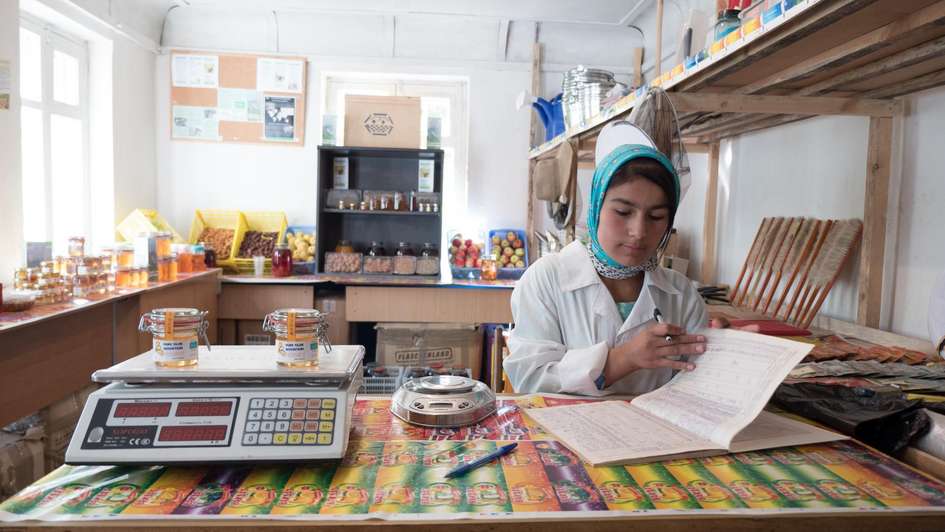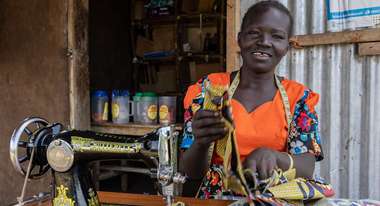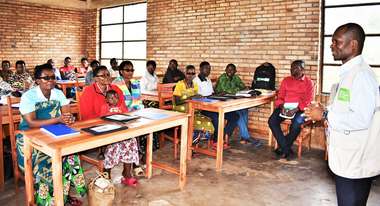A sustainable economy for all
Welthungerhilfe is working to achieve the goal of Zero Hunger by 2030 by harnessing the positive effects of a sustainable market economy. The value-chains approach creates new income sources for people in structurally weak regions and helps build modern business structures.

Welthungerhilfe (WHH) believes strongly in the positive effects of an inclusive and sustainable market economy. The aim is to identify and establish new sources of income from and for people in structurally weak regions. With guidance from experts, the people involved in the project develop modern supply chains and value chains in the areas of agriculture, services, or trade. Goods are ideally not just produced but also processed on-site, so more value is created there. For example, by drying, preserving, packaging, or storing agricultural produce. People running new businesses gain an income, which boosts the regional economy and can help overcome poverty and malnutrition.
Local supply chains energize the economy
Boimazar Kurbanov had never dreamed of becoming a beekeeper. As a farmer in the Zerafshan Valley in Tajikistan, he lived from the vegetables he grew and money from his sons in Russia. He is now proud to sell honey to big hotels in the capital Dushanbe via a beekeepers association. He has invested his earnings in home insulation, solar panels, and an energy-saving oven. This material comes from the region. Welthungerhilfe has been training manual workers. The economy has been energized and more and more young people are staying in the valley.
Three models, one goal: promoting entrepreneurship
The example of Tajikistan shows two models for market-oriented project work. The beekeepers association is an example of developing social enterprises. In this case, WHH shows people new ways to process and refine products, while providing basic and further training, and helping the local population to organize in associations, cooperatives, or private companies. They can then position themselves in the regional, national or international market with support from WHH. The rose growers in Afghanistan are also a successful lighthouse project.
The advantages of the value-chains approach
- The project participants gain business skills to build more competitive businesses.
- Systematic value creation and local/regional supply chains create new jobs and bring income for women, men, and young people.
- Entrepreneurial spirit, competition, trade, and cooperation with private business partners add fresh momentum in structurally weak areas.
- Value-creation programs energize the economy in the long term, and profits remain in the region.
- Regions rich in raw materials profit from on-site processing. Otherwise raw materials are often exported, and the value is increased elsewhere.
- People develop sustainable business models that continue after the end of the project in an independent and flexible way.
- The project participants become autonomous entrepreneurs that take control of their own future.
The manual workers in Tajikistan provide their community with basic services such as electricity and energy-efficient technology. WHH helps provide the necessary skills, infrastructure, and market analysis. A waste project in Sierra Leone follows the same service principle. The third value-creation approach is to promote the existing private sector. In Sierra Leone, WHH is connecting peasant cocoa producers with private companies that are concerned with quality standards, further training, fair wages, processing, and marketing.
All three models have measurable results. They have been documented through qualitative interviews by trained expert evaluators for example. The resulting standardized questionnaires show that income has increased, the families are more satisfied, and they are planning further steps to advance their businesses.
Value chains – a known quantity carries more weight
WHH projects have always involved on-site value creation and building up small companies. It is now clear that this approach must receive a greater focus, to achieve the goal of Zero Hunger by 2030 in a sustainable way. Cooperation with the private sector also plays a central role. WHH uses its many years of experience to build up inclusive and social entrepreneurship as a strategic pillar of its work.







